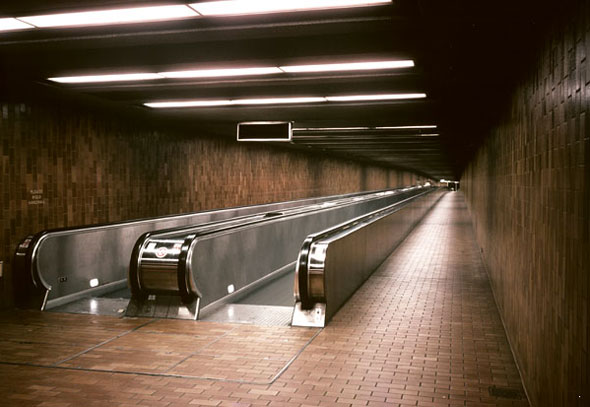 The Bloor-Danforth and Spadina line platforms of Spadina station really should be separate stations, such is the physical distance between the two. Everyone but the greenest of newcomers knows a change at St. George is vastly preferable to traversing the long underground walkway at the next stop.
The Bloor-Danforth and Spadina line platforms of Spadina station really should be separate stations, such is the physical distance between the two. Everyone but the greenest of newcomers knows a change at St. George is vastly preferable to traversing the long underground walkway at the next stop.
When the Spadina line opened in the 1970s, the long walk was made easier by a lengthy moving sidewalk that simultaneously delighted and enraged subway users. It was one of the most interesting features of the subway system - and a hell of a lot of fun for kids - but it was also expensive to maintain, prone to break down, and ultimately went the way of the Dodo in 2004 when the TTC decided that it just wasn't worth the money to keep.
Many people remember the moving walkway as it was only removed about a decade ago, but the story behind it is an interesting one. When the Spadina Extension was built in 1978, the current north/south platforms were initially designed to be a separate station altogether, one which would go by the name Lowther, after the street which runs immediately to the south of the station. In the end, the TTC had a change of heart and decided to build the 150 metre long walkway to link the two stations under the the same designation.
 There are a couple of reasons why they did this. Aside from the obvious savings on staffing costs (the north/portion of Spadina Station does not feature a fare collector), Transit Toronto explains that concerns about the financial viability of the University Line might have played a role.
There are a couple of reasons why they did this. Aside from the obvious savings on staffing costs (the north/portion of Spadina Station does not feature a fare collector), Transit Toronto explains that concerns about the financial viability of the University Line might have played a role.
"From 1969 to 1978, the University subway was closed Mondays to Saturdays at 9:45 p.m. and all day Sundays and holidays. If this arrangement had to continue, Spadina Station would have to be used as the southern terminal station of the Spadina line (although it would have been far more convenient for passengers to transfer to the Bloor-Danforth subway at St. George). This is why a crossover was installed just to the north of the station and "Spadina" installed on the subway rollsigns. Thus by naming the station 'Spadina' people would be able to connect the station in their minds with the Bloor-Danforth subway far more readily than a 'Lowther' terminal."
 Obviously ridership on the University Line increased to the point that there were no more early closures (it's almost funny to think that was ever necessary), and the moving walkway was a boon for folks using the Spadina Bus who wanted to head north upon arrival at the station (if going south, it makes more sense to head to St. George). As many as 11,000 people were using the walkway per day in the years leading up to its eventual demise, but faced with exorbitant costs to refurbish and maintain the walkway, the TTC closed it down before removing it altogether.
Obviously ridership on the University Line increased to the point that there were no more early closures (it's almost funny to think that was ever necessary), and the moving walkway was a boon for folks using the Spadina Bus who wanted to head north upon arrival at the station (if going south, it makes more sense to head to St. George). As many as 11,000 people were using the walkway per day in the years leading up to its eventual demise, but faced with exorbitant costs to refurbish and maintain the walkway, the TTC closed it down before removing it altogether.
It's not difficult to spot where it once was, as the tiled laid down in its place doesn't match those that were originally installed in the tunnel. If you look closely, you can even see signs prompting riders to hold onto the handrail. The true tragedy in all of this is, of course, that there was nothing quite so fun as bombing down the moving walkway on a bike late at night when no one was around. Oh well.
Photos by Ben Mark Holzberg/Library and Archives Canada, Axel Luyckx, and Tom Cochrane.